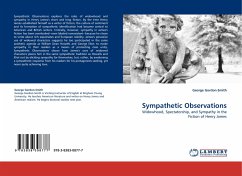Sympathetic Observations explores the roles of widowhood and sympathy in Henry James's short and long fiction. By the time Henry James established himself as a writer of fiction, the culture of sentiment and its formation of sympathetic identification had become central to American and British writers. Critically, however, sympathy in James's fiction has been overlooked--even labeled nonexistent--because he chose to write about rich expatriates and European nobility. James's pervasive use of widowed characters suggests he too participated in the same aesthetic agenda as William Dean Howells and George Eliot: to evoke sympathy in their readers as a means of promoting class unity. Sympathetic Observations shows how James's uses of widowed characters places him in the same sympathetic tradition as Howells and Eliot not by eliciting sympathy for themselves, but, rather, by awakening a sympathetic response from his readers for his protagonists seeking, yet never quite achieving love.








